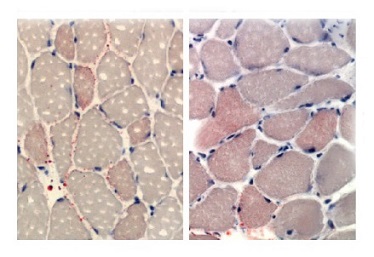AI-Based Tool Identifies Myosteatosis As A New Silent Killer In Many Asymptomatic Adults!
Thailand Medical - Myosteatosis May 19, 2023 2 years, 9 months, 1 week, 6 days, 20 hours, 29 minutes ago
We live in an age of unprecedented food supply and skyrocketing sedentary lifestyles, particularly in developed or developing countries. This unique situation propels the storage of excess energy as lipids in adipose tissue, leading to obesity. As we scrutinize the health impact of obesity, one silent, often overlooked player emerges from the shadows - myosteatosis.
 Myosteatosis - large amounts of fat In the muscles
Myosteatosis - large amounts of fat In the muscles
Myosteatosis is a condition where fat accumulates within the muscles. An increasing body of research indicates that this understated pathologic condition is an essential predictor of mortality in asymptomatic adults, rivaling the risks of even smoking or type 2 diabetes!
The risk tied to myosteatosis remains mostly unexplored since it's usually detected in patients who are already undergoing medical imaging for other illnesses. Thus, information about its health risks in asymptomatic patients has been limited. Traditional methods like BMI calculation inadequately reflect body composition and the associated health risks as it doesn't factor in diverse fat accumulations.
On the contrary, abdominal CT or MRI scans provide a comprehensive reflection of body composition. These scans unveil various forms of fat accumulation, such as visceral fat around the abdominal organs, liver steatosis indicating high fat in the liver, and myosteatosis. Despite the mounting evidence, myosteatosis has remained overlooked in the medical community.
A recent study by a research team led by Dr Maxime Nachit, a post-doctoral researcher at the Institut de Recherche Expérimentale et Clinique at UCLouvain in Brussels, Belgium, delved into the association between myosteatosis and mortality risk.
The study team concurrently studied other factors such as visceral fat, liver steatosis, myopenia (muscle wasting), and obesity.
The study team used an AI tool to extract body composition metrics from abdominal CT scans of asymptomatic adults. These patients had undergone routine screening for colorectal cancer between 2004 and 2016. Major adverse events and death were recorded over an average follow-up period of 8.8 years. Out of 8,982 adults included in the study, 507 died during the follow-up period.
The striking finding was that myosteatosis was associated with an increased risk of major adverse events and was found in 55% of the study participants who died.
Dr Nachit told
Thailand Medical News, “Interestingly, the relationship was independent from age or markers of obesity such as BMI. In other words, this means that fat accumulation in the muscles is not merely explained by being older and/or having fat overload in other locations of the body.”
The world of medicine is moving toward personalization, tailoring medical management based on a range of information, including genetics, medical history, physical characteristics, and molecular evaluation. In this context, myosteatosis, retrievable from routine medical images, is a strong indicator of an individual's mortality risk.
<
br />
There is an urgent need to address this silent threat. As sedentary lifestyles continue to flourish and with myosteatosis remaining off the medical community's radar, the question looms - how do we confront this hidden peril?
Future research needs to determine whether myosteatosis is solely a biomarker of poor health status or whether it causally associates with an increased risk of death. Establishing a screening process and figuring out its management in asymptomatic adults is crucial. Besides, understanding how myosteatosis influences prognosis is largely unknown, and research must unveil this mystery.
As medical technology advances, using AI-based body composition metrics from routine abdominal CT scans can identify myosteatosis as a key predictor of mortality risk in asymptomatic adults.
Understanding this can propel a new perspective in preventive healthcare strategies. The information can help clinicians to monitor, prevent, or manage myosteatosis. Moreover, by incorporating myosteatosis data into predictive mortality models, medical practitioners can devise more personalized and effective treatment plans for their patients.
Nutritional approaches coupled with physical activity may also prove to be crucial in combating myosteatosis. The consumption of a balanced diet rich in protein, omega-3 fatty acids, and fiber can help reduce the risk of muscle fat accumulation. Regular physical exercise, particularly resistance and endurance training, can also aid in promoting muscle health and limiting the onset of myosteatosis.
Additionally, the healthcare community needs to educate the public about the dangers of sedentary lifestyles and the consequent risks such as myosteatosis.
Public health campaigns promoting physical activity, balanced nutrition, and healthy aging can play a crucial role in controlling the prevalence of this condition.
Despite the current lack of pharmacological treatments specifically targeting myosteatosis, the potential for future therapeutic developments remains promising. As we gain a better understanding of the molecular mechanisms underlying myosteatosis, novel drug targets could emerge, leading to more effective interventions.
In summary, myosteatosis has emerged as an underestimated health risk in recent years. Although it often remains hidden and overlooked, the research indicates its profound impact on overall mortality rates. However, with ongoing advances in medical technology and an increased understanding of the condition, we can anticipate the development of more effective strategies to combat this silent killer. It is a timely reminder for us to renew our commitment towards promoting healthier lifestyles and investing in research that can lead to life-saving breakthroughs.
The study findings were published in the peer reviewed journal: Radiology.
https://pubs.rsna.org/doi/10.1148/radiol.222008
For the latest on Myosteatosis, keep on logging to
Thailand Medical News.
